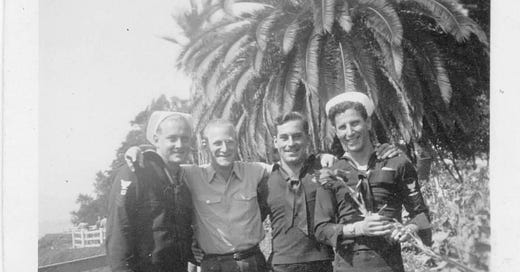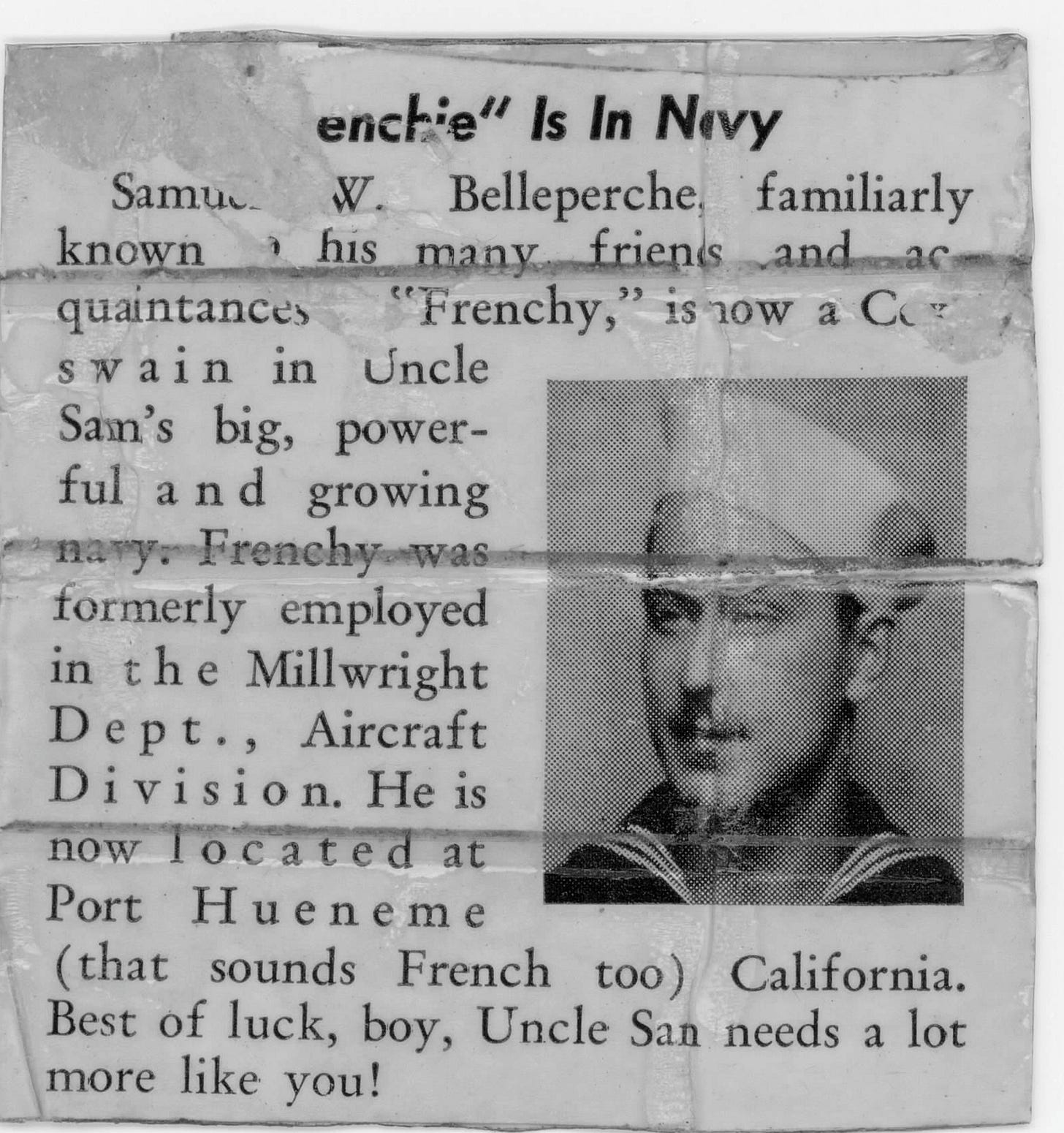Thanks for signing up for the Substack, Joe Martelle. A former Marine, Joe recently contacted me and said he is working on a book, and that he found some useful information in my interview with Jerome Auman.
I did that interview on May 24, 1998, at a military museum in Eldred, Pa. A local veteran had left his book collection to the museum, and there were so many books that the museum had to build a new wing to house them.
Now this is 26 years ago! I told Kim that when I posted the interview online, I was contacted by Paul Belleperche, whose uncle, Frenchy Belleperche, was mentioned in Jerome’s interview. and he even sent a couple of pictures.
Jerome was in American Samoa getting ready to board troop transports for what would be the invasion of Tarawa. The night before he was due to ship out, his name was called to report to the first sergeant.
“So I trot down to the first sergeant’s, well, they didn’t have an office, they had a table sitting out under the trees. And he says, ‘Pack your bag, you’re being transferred.’ And I was transferred into the military police company on the island. Now this military police company had the brig for the whole South Pacific area. If you got in trouble, that’s where you wound up, in our brig. And I spent another possibly six months in the military police, and I could tell you a lot of stories about that.
“Well, I could tell you a story. I might as well tell it, as long as we’ve got lots of time. There was a Navy seabee battalion, or a company, on the island, and they were in charge of the generator for generating all the electricity on the island. So it was a pretty big generating station. And they also had a submarine base there that refueled submarines and torpedoes. I never was in a submarine, but whatever the submarine needed, it came to this base and refueled and resupplied. That’s what this Navy battalion was in charge of.
Well, the MPs, counting me, each one got two fellows from the seabee battalion to take a month’s tour of the MPs, because there were sailors and Marines coming in, and they didn’t want the Marines picking on the sailors too bad.
There was this one fellow by the name of Frenchy Belleperche, I don’t know what his right name was but Belleperche was his last name. He was from right across from Detroit, Windsor, Canada. He was a Canadian, but he enlisted in the United States Navy and became a seabee. We became very close friends. And one night, or one day, I don’t know what time of the day it was, he came to me, and he says, “Jerome, I’m in real big trouble.”
I said, “What did you do, Frenchy?”
He said, “Well, you heard about the stink being raised on the island. I’m going to be arrested tomorrow. Will you do me a favor?”
I said, “What is it?”
He said, “Take this cigar box.”
“What’s in it?”
“Look.”
I opened it up. There was $13,800 in $20 bills.
I said, “What the hell am I gonna do with this?”
He said, “Take it. You’re going back to the States pretty soon. Take it home.”
I said, “Frenchy, how in the hell would I explain this much money making $21 a month?”
He said, “Oh, just take it!”
I took the box, and I put it in my footlocker, right down on the bottom, and put everything on top of it. Nobody else knew anything about this.
Well, the case came up, and here I didn’t know, he was starting to take me around and introduce me to friends, but I didn’t know what was going on yet. Anyway, what they were doing was taking what they called torpedo juice, now that’s the fuel that you shoot the torpedoes with, and they were distilling it, making 100 proof alcohol. They were selling that for $100 a gallon, and they were supplying every ship and anybody that wanted alcohol on the whole island. His share, just like I said, was over $13,000. He said, “I can’t use it. I’m going to be arrested. They’re going to find it.”
So I had it in my footlocker for a couple of months — maybe more than that, maybe three months. And he got arrested, he got court-martialed, I don’t know what rank he held but he was busted down to the lowest rank in the Navy, and he got six months in the brig. Well, if you knew the guy, he was one hell of a nice man. I mean, he was wonderful, and I’m not ashamed to say he was a friend of mine. And from there, almost from the first day he was in the brig, they made him a model prisoner, and he only had to sleep in the brig at night. In the daytime, he was, I don’t know what term they used, but anyhow he was in the officers’ mess doing cooking and cleaning and so on.
Like he said, I was going to go back to the States. At any time, there’s no general will travel alone; if a Marine general was ordered back to Washington, he had to have a detachment of Marines travel with him. I had sixteen months overseas at that time, and I got chosen as one of the Marines who were in this detachment to travel back to the States with the general.
So I go to Frenchy. I said, “Frenchy, I can’t take this home. You know, on the inter-island boats there’s always three or four MPs there inspecting baggage inter-island here. Now what are they gonna do when I get back to San Diego or San Francisco or wherever we’re going? How will I explain that?”
He said, “I don’t know, but I want you to take it home.”
I said, “No, I’m not taking it home. Here. It’s yours. You’re free all day long. You hide it someplace.” So I gave him his money back.
And I didn’t know it, but when we came home, through customs, there’s not a soul who even said, “What’s in this bag?” But how would I explain that lump sum of money on $21 a month?
“When he came to you the first time,” I asked, and said, ‘You know about the stink that’s going on,’ what was the stink?”
“Oh. Well, as you know, in any organization, whether it’s the Army, Navy, Marines or whatever, there’s always somebody who wants to cut in on, well, there was two fellows who found out about this making of this liquor, and they wanted to cut in on it. And these guys said, ‘No, we don’t want nobody else in on it, because we’re a pretty nice, well-regulated organization.’ So these other two Navy fellows, instead of leaving well enough alone, they decided they’re going to be smart and they’re going to make their own. But what they did, they took shellack, you know, that paint is mixed with, and sold it out of the barrels just like that. And the stink really did stink. I don’t remember the figures, but there’s three or four died. Some went blind. Some went crazy. Well, when you get on an island and that kind of stuff turns up, it is a stink. And then some just went crazy, I mean wild, from drinking the shellack without being distilled or changed or anything. And that’s what happened to Frenchy. So the roof caved in.”
“Did you ever find out what happened to Frenchy and the money?” I asked.
“Yes. It was, oh, 1948. I was discharged in December of ’45, and in 1948 I had to go to the VA in Erie for a physical, because I was discharged with 10 percent disability for arthritis in my hips and knees. I was married, and my wife went along with me to Erie for this physical, and I said, “Now we’re at Erie, let’s drive out to Windsor and see Frenchy.” Of course, I’d corresponded with him and he said yeah, he’d be home. We went to Windsor and looked him up. We had a good time together for four or five hours. And he said, “You know, I wish you would have never given me that money back because I spent every damn penny of it in poker games.” He said he didn’t bring a penny of it home. So that’s what happened to Frenchy and his money. And if I would have brought it home, like I said, there wasn’t nobody even asked me what was in the bag.
“But anyhow, to get back to the general coming back to the United States, on the way back we stopped at Pearl Harbor, and we were allowed shore leave. So I go ashore and look around, and who do I find but my squad leader from the .30-caliber water cooled machine gun, which was the Second Defense Battalion of the 22nd Marines. And I said to him, I can’t remember his name, I said, “Where are the rest of the fellows?”
He looked at me, and he said, “You’re looking at the only one that came back alive.”
And I don’t have to tell anybody that was there how I felt. To think, “Thank God for the transfer to the military police in Samoa.” Because I, too, probably would not have come back.
Jerome Auman: “Write Your Story” (audio)
Jerome Auman: Frenchy (audio)






Am Enjoying your posts Aaron. Some have helped with information of my Dad's times spent in the 90th Infantry Division and stories he has told me, and especially the ones of my Dad's experiences!
I really like you posts and humor. You have a unique approach that b entertains while informing. !